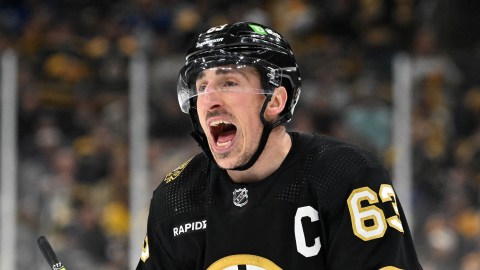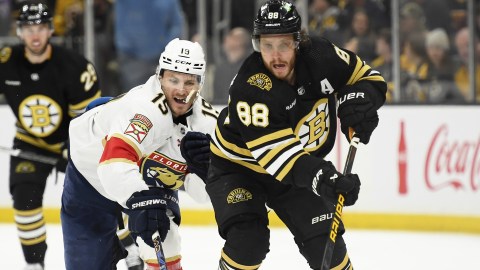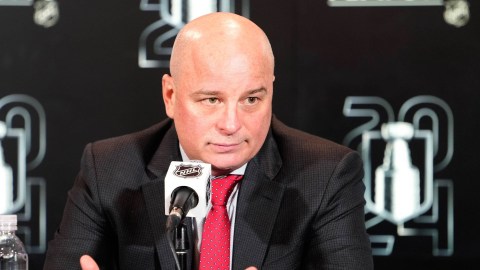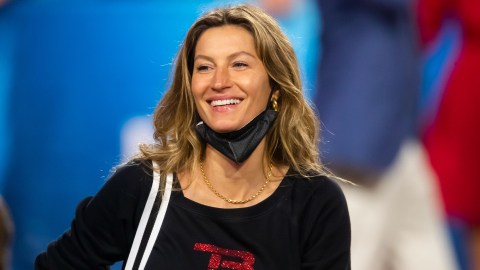Some of the most important days in Red Sox history have come on or around Major League Baseball trade deadline day.
The deadline is typically one of the most interesting days on the baseball calendar because of its unpredictability. Teams in contention can solidify themselves in the championship hunt by swinging a deal for a missing piece while rebuilding clubs look to cash in expiring chips for young, fresh talent.
Oftentimes, teams that actually win the World Series do so with rosters built on both sides of trade deadline ledger in recent deadlines.
The Boston Red Sox are no different. Here are the five best deadline deals in franchise history.
Story continues below advertisement
HONORABLE MENTION: Red Sox clear the decks by sending Adrian Gonzalez, Carl Crawford, Josh Beckett and Nick Punto to Dodgers
This one doesn’t make the list, as it wasn’t technically a deadline deal. It finally was executed Aug. 25, 2012, after the players involved passed through waivers. The Red Sox didn’t get much on-field capital in return, but the move removed $250 million off the books through 2018. Between this deal and the end of 2018, the Sox would win two World Series.
2008: Red Sox acquire Jason Bay from Pittsburgh in exchange for Manny Ramirez (to Los Angeles), Craig Hansen and Brandon Moss
“I’m tired of them. They’re tired of me.” It turns out Manny being Manny had a shelf life in Boston. While there’s no denying the slugger is an all-time franchise great, it became quite clear in 2008 the Sox had to make a move. After years of oscillating about whether he really wanted to be with the Red Sox, Boston finally pulled the trigger and shipped Ramirez to the Dodgers as part of a three-team deal. The Red Sox seemingly got out of the Manny business at the right time, too. He tore it up down the stretch for the Dodgers, but he’d play just 199 games after the 2008 season, marred in part by suspensions. Bay, meanwhile, turned into a nice player for the Sox in his short Boston stay. He posted an .897 OPS down the stretch for a team that got to Game 7 of the ALCS, and he returned the following season to hit 36 home runs and drive in 119 runs while earning an All-Star selection and Silver Slugger.
2018: Red Sox acquire Nathan Eovaldi from Tampa Bay in exchange for Jalen Beeks
This is certainly the best in-season trade of the Dave Dombrowski era, and it was the perfect move to make amid Boston’s historic 2018 campaign. The Red Sox needed to add at least one pitcher and decided to take a flier on Eovaldi’s powerful, (twice) surgically repaired right arm. It certainly paid off. Eovaldi was good, not great down the stretch for the Red Sox in 2018, but the postseason was a formality. He saved his best work for the postseason, though, most notably his incredible six-inning relief performance in Game 3 of the World Series. Alex Cora made perfect use of Eovaldi in that postseason run, using him both as a starter and reliever, with the Sox going 5-1 in the six playoff games he appeared. Eovaldi parlayed that into a new contract, one he largely lived up to, especially in 2021 when he made a league-leading 32 starts, finishing fourth in American League Cy Young voting. Beeks, meanwhile, has largely been just a guy out of the Rays bullpen.
2004: Red Sox acquire Orlando Cabrera and Doug Mientkiewicz in four-team deal in exchange for Nomar Garciaparra (and other pieces)
Of course this makes the list — it’s the signature move for Theo Epstein and the drought-breaking 2004 Red Sox. Epstein said in the moment and since that it was an extremely difficult decision to trade a franchise icon, but in hindsight, it sure was the right (and perhaps even obvious) move. Garciaparra’s path to Cooperstown had been derailed by injuries, and while he was still a very good player, he was already starting to drop off. The Red Sox tried to re-sign him, to no avail, opening the door for a deal. Boston badly needed to upgrade its defense, especially on the infield, which is exactly what it did with a pair of Gold Glovers in Cabrera and Mientkiewicz. Garciaparra seemingly had grown tired of the Boston baseball experience, and this deal (as well as a Dave Roberts trade) was a shot in the arm. The Red Sox went 42-18 the rest of the way on the way to, of course, winning their first World Series in 86 years.
Story continues below advertisement
2014: Red Sox acquire Eduardo Rodriguez from Baltimore in exchange for Andrew Miller
Miller’s post-Boston days were impressive. He was an All-Star twice, earned two top-10 Cy Young finishes as a reliever and was downright dominant for Cleveland on the way to an AL pennant in 2016. The fact of the matter, though, was he provided very little stretch-run use for the 2014 Red Sox, a team that finished 20 games below .500. On deadline day, general manager Ben Cherington sold off Miller (with two months left on his contract), Jon Lester and John Lackey, the Miller deal being by far the best of the three. The Sox got Rodriguez in return, who was, at the time, a top-100 prospect. ESPN’s Keith Law called it the best value move of the day, which proved prophetic. Rodriguez developed into a mid-rotation starter for the Red Sox, who was part of the historic 2018 club. He then had the best season of his career in 2019 when he went 19-6, making a career-high 34 starts and earning a sixth-place finish in Cy Young voting.
1997: Red Sox acquire Jason Varitek and Derek Lowe from Seattle in exchange for Heathcliff Slocumb
With all due respect to Pedro Martinez, this might be the best trade in Red Sox history. It’s easily the best deadline swap. Dan Duquette pulled a heist, landing two franchise mainstays in exchange for a 31-year-old reliever who was allowing nearly two hits and walks per inning while walking nearly seven batters per nine. Varitek, meanwhile, went on to be the face of the franchise. He earned the captaincy as he made three All-Star teams, was part of two World Series championships and remains a major off-field pillar of the organization. Lowe wore a variety of hats for the Red Sox, leading the league in saves in 2000 and finishing third in Cy Young voting in 2002 a year in which he threw a no-hitter and started the All-Star Game. For good measure, he started and won the American League Series and World Series clinchers in 2004, too.
Featured image via Darren Yamashita/USA TODAY Sports Images















